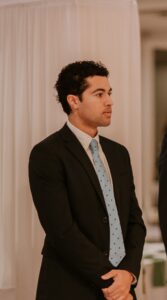
Last year, you’ve had a chance to meet a firendly lector strolling through our hallways or maybe, you even had the opptunity to be part of his classes.
He had travelled to many places, but during his stay in Slovakia he became part of our school community, he enjoyed getting to know us and he eagerly explored Slovak towns and villages. His name was Cole Matthews and I’ve been lucky enough to conduct an interview with him so you can get to know him even after his departure.
Could you briefly introduce yourself, where are you from, what have you studied?
My name is Cole Matthews, I´m from United States of America. I grew up in Massachusetts, the state of Massachusetts, until I was 18 years old and my family moved to New York City, so when people ask me where I´m from, I normally say I´m from Massachusetts. And what I studied, so in university I went to Bowdoin College, which is a school in the state of Maine, and I studied sociology, which was my major area of focus and then my minor was visual arts. So, I did a lot with creating art.
Where were you growing up in Massachusetts?
I grew up in a town called Wellesley, which is like 30 minutes outside of Boston, which is the major city in Massachusetts. I went to school there my whole life and played sports there my whole life. So, from the age of when I was born, so zero until 18, I was just in Massachusetts.
What countries have you been to so far?
In terms of continents, I’ve been to Europe, South America and Asia. I haven’t been to Africa or Antarctica yet, which I want to get to at least one point. I want to visit all the continents, but countries – I’ve been fortunate enough to go to a lot. In Europe, for example, I’ve been to almost all of Western Europe, just not Switzerland. I have 13 countries left in Europe I have to visit before I’ve been to all of them. My goal is to visit all the countries in Europe.
That answered my next question, what countries do you want to visit next and why? Do you have some kind of list?
Yes, I do. I want to do the Baltics. So, like Estonia, Latvia and those countries up there. That’s kind of my next goal. I also want to do some more Eastern Europe. I want to go to Romania and Bulgaria because I feel like those countries will be harder to get back to when I’m older, because I won’t probably be in Europe for the rest of my life, I’ll probably go back to the United States. It’s a lot harder to travel to those countries than it is to like Spain or England or France.
How did you get into travelling and what does travelling mean to you?
I was very fortunate, my family love traveling, so, growing up, we’d always do at least one or two trips a year where we would take a plane somewhere. Whether that was in the U.S., like California or Hawaii, or it would be in Europe or South America. So, kind of through my family, I got a love for traveling and seeing new cultures, tasting new foods, just getting new experiences. And personally, I’ve started to really enjoy traveling my junior year of college when I studied abroad in the Netherlands, in Amsterdam, and lived there for five months. And then through that point, I got to travel a lot alone and see a lot of European countries. And that’s kind of when I fell in love with solo travel. That’s why I wanted to do this experience in Slovakia. I think getting to explore new cultures, taste new foods, meet new people with different shared experiences and different lives and see someone else’s perspective. I think overall travelling helps us understand the world better and makes the world a better place. Being able to connect with people, I think, is what it means to me, mostly.
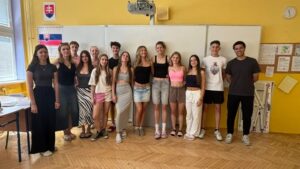
What has brought you to Slovakia?
On a logistical level it was the Fulbright program, which is a program that’s very popular and very well known in the United States. Normally after college, once you graduate, you can apply to either teach English or do research for one year in almost any country in the world. I was deciding between a couple countries. I think I narrowed it down to Taiwan, Slovakia, and Thailand. Two in Asia and then one in Europe.
Why I chose Slovakia? There’s a lot of reasons. I kind of wanted to be in a place in Central Europe because there’s a lot of countries in this area that I haven’t been to. Like before this, I haven’t been to Poland, Austria, Hungary, Czechia. I got to see all those countries since being here. But I also did a research project on a Slovak photographer who did landscape photography when I was in Amsterdam during my photography class. And through that, I kind of fell in love with the natural beauty and hiking of the High Tatras, the low Carpathians, just all the beauty here in Slovakia.
Have you enjoyed exploring Slovak cities and towns? Which places stood out to you?
Yeah, I have. That’s probably my favorite thing to do so far. Just take a train somewhere and go to a town, which has been awesome. Bratislava specifically too but Trnava is the best because I live and work here. Bratislava is probably my second favorite I go there a lot because it’s close. I’ve been to Košice, Prešov, Spišská Nová Ves, which stood out to me because of Slovak Paradise. I did a lot of hiking there. I even went to Krompachy to visit a friend who lived there and we had our Thanksgiving, with all the other Americans from the program, we met there to celebrate. I’ve also been to Žilina and Nitra, and over here in the west Piešťany, Smolnice, Pezinok.
I normally do like one trip a weekend. So, I’m trying to remember all the different weekend trips I did. I’ve been fortunate, I’ve gotten to see a lot of places in Slovakia.
What has been your most challenging experience at our school so far?
Teaching at the start. I came into this having no teaching experience from the United States. I just finished university. I was kind of nervous about how it would go in the classroom, if the students would be respectful to me, if they would be engaging, but also just how I would be as a teacher, if I would be an effective teacher, if I would be an interesting teacher, if I could balance having fun with actually learning, and that’s been a struggle that I still deal with. It was a little challenging trying to figure out lesson planning, how to be effective, what I should do more of, what I should do less of. There’s a big trial and error period and I would say that’s the most challenging thing. I think it’s hard when you only have up to eight months of teaching experience, but it’s something I’ve really enjoyed so far.
What places did you see thanks to our students, are they even inviting you on adventures?
I’ve definitely gotten invited to do some things, I’ve done some sports events like playing basketball or football. I’ve even just hung out and got pizza, ice-cream or coffee with students. I’ve also tagged along on a lot of like field trips to different museums which has been fun. It’s definitely nice getting to know students outside of the classroom because it’s a completely different dynamic where it’s more like we can just hang out and be friends rather than being a teacher in a classroom. I feel like I get to know people more outside of the classroom which is nice.
Do you plan your trips carefully or do you tend to go with the flow?
I definitely go with the flow and sometimes this is kind of a problem that I run into. Sometimes I just book one-way plane tickets or train tickets, I like that because you have freedom, so you don’t need to be in a certain location because you have to fly home, but that can lead to a lot of issues. So probably the most spontaneous thing I did here was during our week off and I did a trip to Albania, Macedonia, and Kosovo, which are countries that a lot of Americans have never been to and they never would think they’d go to those countries. I was one of those people. I never thought I’d find myself in Macedonia or Kosovo, but I took a one-way flight to Albania and then just randomly I found out you could take a bus to Macedonia, so I did that. Then I took a bus to Kosovo and it was an interesting bus ride where they overbooked the bus so people were sitting down in kind of the middle of the bus and it was a small van more so than a bus, but I’ve really enjoyed doing spontaneous and random things, but sometimes it can get you in bad situations where there’s no flight back home or the flight back home is too expensive, so you have to figure out a different way to travel because you’re booking everything last minute.
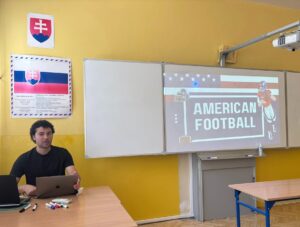
What do you think is the perfect time frame to explore a country or culture?
I think anytime. There’s pros and cons of everything, normally I like traveling when it’s warmer outside, especially to certain places like if I want to go to the beach but a negative side of that is that there’s a lot of tourism, a lot of people go to the same places that you, which makes it harder to see it. Because there’s more tourists and people trying to do the exact same thing, you get less of an authentic experience, so I think the best time to see a country could be in the off-season when you get a more authentic view of how people are living, what they’re doing, not in the summer or the popular seasons. An interesting time to see a country is also when there’s big cultural events happening, like specifically, for example if you want to visit Slovakia, maybe during Easter time or maybe during certain festivals that you have here, I think that’s how you get more of an authentic experience and you get to see the culture more.
How full is usually your schedule?
I would say I have a good work-life balance where I teach for a certain amount during the day, but then I also have a lot of free time where I can go off and be within the community or have free time for myself or just explore Slovakia, I wouldn’t say it’s too packed or too full, which I’m grateful for because I have definitely opportunities to go and see the rest of the country.
Is it hard for you to understand our English? Have you ever had to work with someone that didn´t speak a word in it?
I would say that happens on a daily basis, just being here within Slovakia. I don’t expect people to know English and I really try hard to not make someone speak English to me if I have to, whether that’s using Google Translate or trying to learn certain things to order in a coffee shop or in a restaurant. I don’t think it’s an issue. I’m in your country and I really appreciate when people are able to speak English back to me, but I don’t expect anyone to speak English to me nor necessarily want them to speak English to me. In the school, I think the English level has been amazing. I’ve been really impressed with students just talking to me, whether it’s like outside in the hallway or even in class. Even if students speak fast or if they have an accent or anything, I can always understand their English and I want them to know that I think their English might be a lot better than they think it actually is. I’ve been very impressed and it’s been very helpful to have English speakers here at the school.
What languages do you like, are you studying any? How do you feel about the learning process?
Yes, so I took five years of Spanish in high school and that’s a language I’m going to continue to learn when I go back to the United States. In college, they didn’t have the best language system for me at my school and I chose to study other areas rather than a language. I took a long break from Spanish and forgot a lot of it, but that’s something I want to get back into when I go to the United States.
At my school growing up, I didn’t have the option to learn a foreign language until high school, in what would be your ninth grade. I think I really started too late and if I was learning say Spanish from middle school or before that, kind of like how you guys learn English, it would have been a lot more helpful, so I wish I started the language learning process sooner.
What are the most significant differences in behavior of Slovaks and Americans or you´ve noticed?
There’s definitely a lot, not that it’s good or bad, but when I came here one of the first things I was really surprised by, I’ve mentioned this in a lot of classes, was that you don´t have as much small talks. In the U.S. it’s very common to just say hello to a stranger, or maybe at a cafe have a small talk with the person who might be serving you, you’ll talk about the weather or how they’re doing or whatever. When you see someone on the street in the U.S. it’s very common to make eye contact and smile or wave. Here, I don’t think that happens as much, if I’m walking down the street across from someone and I don’t know them and I look at them and maybe smile they’ll probably think I’m weird. Another difference is in the U.S. it’s very common just to say hi, how are you doing, how are you and in the U.S. it’s kind of like a custom to say I’m doing good, I’m doing fine. Here if you tend to ask someone how they are, they’ll actually tell you how they are and they’ll give you a whole rundown of how they’re currently feeling, if they’re tired, if they don’t want to be there whether that’s good or bad, it’s very real and I tend to appreciate that too.
What are your favorite parts of your own culture?
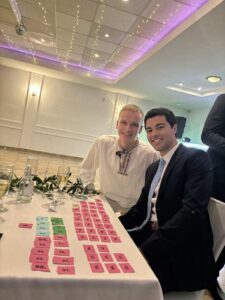
The friendliness, I’m not saying that doesn’t happen here and other places in Europe for example, but in the U.S. it’s something I’m so used to. I grow up having my family and friends and everyone in the area, but also I was just able to like talk with strangers and not be scared through a language barrier for example. That’s something I really miss. I also miss the patriotism and the holidays we have, so for example the 4th of July is something I’ll miss this year and that’s something I always look forward to, it’s a big cultural event where we celebrate our independence and it’s really a time to be proud to be an American and everyone’s always happy on that day and no matter who you are, where you came from, everyone has a big smile on their face and all want to party together and hang out, so I think that’s really fun.
Do you maybe think that Americans are a bit prouder of their nationality than for example European countries?
I think it just depends on the individual and also the time during the world or at the point in which we’re at, like currently there’s a big divide in the U.S. through politics, so I think at certain times people are prouder to be an American, but I think patriotism in general is a big thing in America and people appreciate being from America.
How did the exposure of different cultures change your perspective or life in general?
Going to someone’s house or home, trying their food, seeing how they live just opens your worldview, it makes you think of things differently in your own country, it gives you a perspective on the world and I think that’s the most important thing to gain, a perspective on the world. Understanding how other people are living and why can make you a better person.
What foods and drinks do you miss from your country, are there any of ours you will miss?
Oh, there’s a lot of things I miss from back home. For drinks, I really miss iced coffee, it’s very common in the United States to put ice in your coffee, whether it’s an iced latte, a cold brew, any form of cold drink. I also just miss ice in general, when I’m getting water there isn’t necessarily ice. I also miss my favorite soda, Dr. Pepper, it’s very good in the U.S.
Some of the fast-food chains I miss a lot are Chick-fil-A, Chipotle. From here I’ll miss… Horálky are very good, Kofola has been growing on me. I don’t think I’m going to be able to get guláš or the garlic soup in the United States as easily, and a lot of the cheeses you have here too, like Bryndza, Eidam. It’s so hard to find in the U.S., you need to go to a specific grocery store in a certain area to find it. Now I miss things from the U.S., but I’m sure I’ll miss a lot of things from Slovakia too
How often do you phone or text your family and friends?
I text my family and friends back home almost every single day, but in terms of FaceTime or calling, it’s very hard to do on the weekdays, I tend to only be able to do that on the weekends, like Saturday or Sunday, when nobody’s working and I have more time during the day to call. It’s definitely hard because of the time difference. When my parents are getting off work since there’s a six-hour time difference it’s 11 p.m., so 23:00, at night for me. That makes it very hard because at that point I need to get ready to wind down and go to bed.
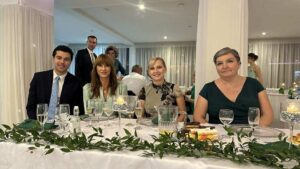
Were your parents worried when you first left? Do they still worry?
I definitely think they are still worried. Early on when I started to solo travel, they were probably more worried than they are now. I’ve told them many good stories about traveling and some bad stories as well but they know that I can handle it now, so they’re less worried. I think this is something different for them though, where I’m away in a different country, halfway across the world for a whole year, as opposed to just a week long or maybe couple months long vacation. It’s something they’re still adjusting to. I’m sure they’re going to be happy to have me back home in a couple months, but I think they’re definitely grateful for the opportunities I have so they’re happy I’m traveling and kind of living life at such a young age.
Do you buy souvenirs? If not – why, if yes – are you keeping them for yourself or gifting them?
I do buy souvenirs, here in Slovakia, I get like little magnets or little items from the souvenir shop for every city I visit, which is very nice. I tend to buy little things, hopefully traditional things too. The most recent souvenir I bought is actually a fridge magnet, which isn’t that traditional or that unique, but I like to get a physical item from every place I go to, I think that’s something that’s very important to me, so I’ll look to get a very personal thing from either Trnava or from Slovakia in general before I leave. I also keep everything the students give me, if a student gives me an item, I put it somewhere in my home. It makes my apartment more homey and more personal. Those are things I’m going to take home with me.
How many things have you packed for such a long time?
I packed a lot of things; I packed way too many things. I packed certain things like my favorite snacks from the United States that, which I actually went through too quickly. I should have saved them better. But things like my favorite shampoo or conditioner from the United States or lotion, I overprepared and I brought everything with me. And now I have three huge bags that I need to bring back to the U.S. that’ll be almost completely empty.
But maybe I’ll fill them up with like souvenirs. I brought too many pairs of clothes. I brought decorations from my apartment, a lot of toiletries that I still have here and I’ll have to bring back without even using. I’ll tell future people that come and do this program, you don’t have to overpack because they have everything you could possibly need here.
Did the program pay for your tickets and extra luggage?
My travel to and from Slovakia was covered, which was nice, it included me being able to check my bags so I could bring extra bags with me on the plane. I didn’t have to pay more.
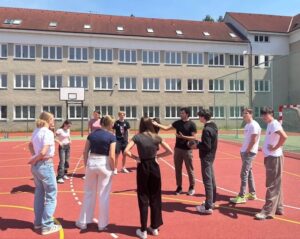
Do you have any message for future for students?
The best advice I can give, and this is something that I took and it’s probably the best advice I ever got because I’m here now and this is such a good experience. You should say yes, yes to new experiences, whether it’s travel or just doing a hike. I think saying yes is the best thing you can do because most of the times I think it ends up good, but even when it might not be as good, I think it builds character. Just saying yes, trying new things, seeing new places, meeting new people.
Is there anything you would like to add?
It’s easy to get caught up in some of the bad stories or experiences, but I think overall I’m so grateful to have chosen Slovakia as the country to call home the past year. I can’t imagine myself in any other country now. I think it’s been very challenging at the start, but I think that’s been amazing for me and I’ve seen myself evolve and develop and be a new person. A lot of that is dedicated to the school, whether it’s the faculty here or the students or the administration. It’s been such a good place to work and call home and I come in with a smile every day and it’s honestly been the best part of my experience here – the students and teaching and being able to work with everyone here. I want to thank everyone at the school for making this such a great and enjoyable experience because I know it’s not easy to welcome a new person or come into class fully engaged, but I really appreciate it and it’s been great and I’ll remember this for the rest of my life.
Thank you so much for your time and for sharing your experiences with us. It was a pleasure talking with you. I wish you all the best in your future adventures!

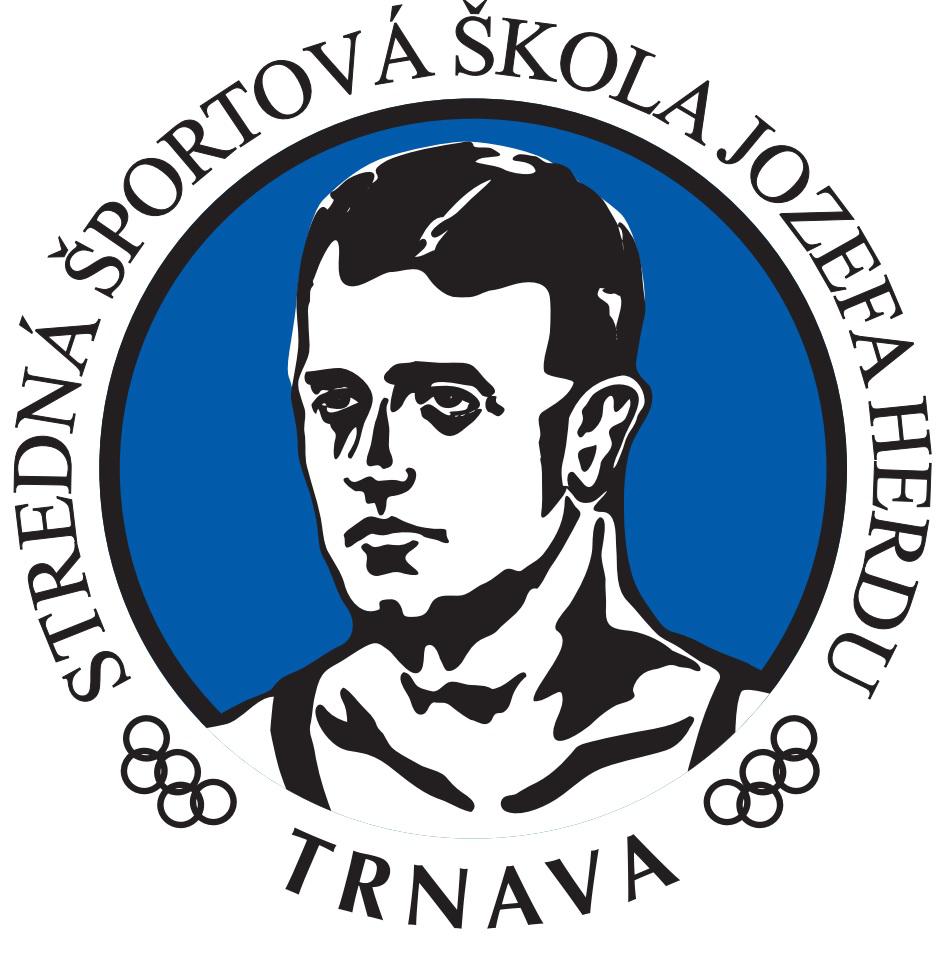

Žiadne komentáre